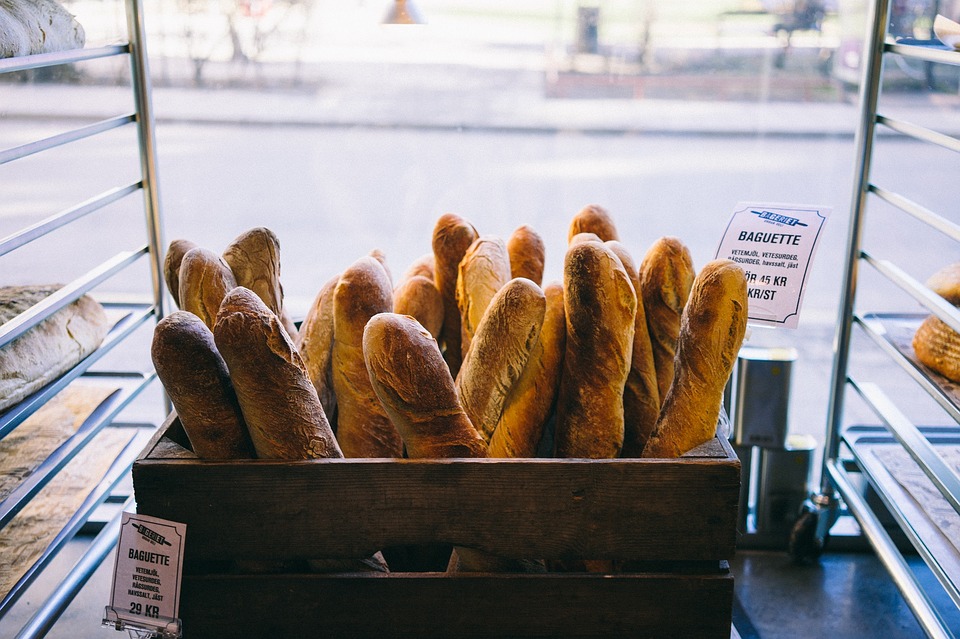La Tentation de la Baguette (The Baguette Temptation) Posted by mtaulier on Jan 14, 2014 in Culture
One of my fondest memories of living in France was walking into the boulangerie (bakery) down the street from where we lived. I can vividly remember the sudden burst of hot air I felt every time I stepped inside. The temperature outside the bakery didn’t matter, les fours (the ovens) never stopped working to bring you the freshest bread at any hour of the day. The heat was tolerable but it was the smell that was so enticing. I made the mistake of walking into a boulangerie on an empty stomach a few times and proceeded to leave with empty pockets but with arms full of warm breads and delectable pâtisseries (pastries).

One day my mother hastily sent me to the bakery to pick up some bread as we were expecting guests pour le déjeuner (for lunch). “Bonjour madame. Une baguette, s’il vous plaît,” (Hello, ma’am. A baguette, please) I said to la femme du boulanger (the baker’s wife) standing behind the counter. “Deux francs” (two francs) she answered. I handed her la monnaie (change) worth two francs and she handed me the warmest, most crispy baguette I had ever beheld. I was smitten and my stomach started growling immediately.
“Merci et bonne journée” (Thank you and have a good day) was all I could muster as I ran out the door into the cool air. My goal was to get home as quickly as possible to avoid la tentation (the temptation) of devouring one of the quignons (the ends of a baguette). I made it only a couple blocks before giving into temptation. I could no longer resist the lure of le trésor doré et croustillant (the golden and crisp treasure) I held under my arm. However, to avoid any possible reprimand, I tried to hide my misdeed by picking away at a small portion on the underside of the loaf and right in the middle. I knew that bread was always cut from either end, so I figured I had a chance of getting away with it if we only ate un tiers (one third) of the loaf. I very delicately began picking at la croûte (the crust) but this was not enough to satisfy me, and before I knew it, I was clawing at the warm and soft mie (the soft part of the bread) on the inside.
It took me longer to get home than I thought, and as they say in France, I had juste le temps de mettre les pieds sous la table (just enough time to put the feet under the table). Our guests had arrived and I placed the loaf on the table. My father picked it up and quickly noticed that it felt plus léger que d’habitude (lighter than usual). He turned it over and my face turned red instantly. La honte (the shame)!! What was I thinking? Why couldn’t I resist? And why did I think I could get away with such a heinous crime? The guests laughed it off and so did my dad. My mother, however, gave me a piercing look and immediately sent me back to la boulangerie to rectify my mistake. I remember le sourire de la femme du boulanger (the smile of the baker’s wife) when I returned less than une demi-heure plus tard (a half hour later) and sheepishly said “Une autre baguette, s’il vous plaît” (Another baguette, please). From my expression, she knew exactly what had transpired. She did not say a word but simply smiled.

Build vocabulary, practice pronunciation, and more with Transparent Language Online. Available anytime, anywhere, on any device.




Comments:
J Wilson:
Thank you – reading this helps to remind me of the French I know and might actually teach me some other bits ! Lovely blog !
Tim:
We holiday in France most years and I know precisely where you are coming from. I love French bread and bakery products and my children love it more than I do. There’s nothing better than hearing the sound of a Baguette being broken, not cut but broken. The taste is wonderful and although we only visited France last week i already long to return!